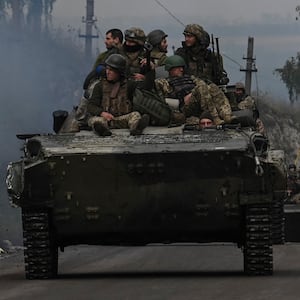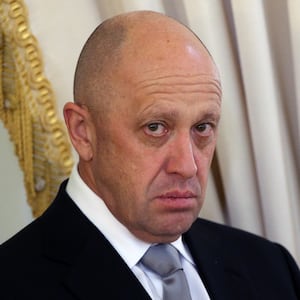After weeks of battlefield setbacks in Ukraine, Moscow appears to have buckled under pressure and plowed ahead with a new phase in the war: urgent “referendums” to annex stolen Ukrainian land and harsh prison terms for defiant troops.
The double whammy began with the announcement early Tuesday that Russia’s State Duma passed legislation introducing stricter punishments for any troops who “voluntarily” surrender on the frontline or refuse to follow orders.
Deserters would get up to 15 years behind bars, while those who surrender face a 10-year sentence. Those who refuse to follow the orders of their commanders face three years.
The legislation, which for the first time also adds the concepts of “mobilization, martial law and wartime” to the Russian Criminal Code, has widely been seen as the first step to launching full-scale mobilization.
After unanimous approval by the State Duma, the legislation will be sent to the Federation Council on Wednesday, according to state media. With the Federation Council also expected to get on board, the new prison terms will come into force as soon as Putin signs the bill–which could happen as soon as Wednesday.
Bizarrely, the legislation was already marked as having been approved at all stages in the government portal as of Wednesday afternoon.
While the move is widely seen as a way for the Kremlin to shore up troops, it was almost immediately met with panicked calls for Russian troops to ditch the war now before it’s too late.
“We call on Russian service members at military bases and on the front to refuse participation in the ‘special operation’ or surrender as soon as possible. This is most likely your last chance—and you need to use it in the next day,” the anti-war movement Vesna wrote in an open letter. A dozen other anti-war groups also are said to have signed on to the appeal.
While Russian social media channels erupted with terrified posts about the prospects of mobilization, Russian proxy leaders in occupied parts of Ukraine announced, almost in unison, that they will be holding “referendums” on joining Russia beginning this week.
“We have set a course for reunification, a return to Russia. And we will not turn away from it,” Vladimir Saldo, Moscow’s puppet leader in Kherson, announced in a video message.
Referendums are now set to be held in Russian-controlled parts of Donetsk, Luhansk, Kherson, and Zaporizhia from Sept. 23-27.
While the Kremlin has long feigned helplessness when it comes to the “referendums”—claiming they are being done at the initiative of residents living in those occupied areas—it didn’t take long for news to trickle out about Russians being forced to take part in the vote.
Inmates at two Rostov penal colonies have already been ordered to vote in favor of the Ukrainian territories becoming part of Russia, according to the independent news outlet Mozhem Obyasnit.
Two sources cited by the news outlet said prison officials at one facility ordered all inmates with Ukrainian passports to vote, while the entire inmate population was ordered to do so at the other.
The apparently frantic efforts to rush through the referendums mark a complete 180 from Russia’s plans just a couple weeks ago, when the Kremlin repeatedly postponed plans for the votes after failing to seize enough territory or win enough support. Sources cited by Meduza at that time said Vladimir Putin had set his sights on Nov. 4 after he became “tired of waiting.”
But by mid-September, even that date no longer seemed feasible after Ukrainian forces won back territories throughout the east thanks to multiple surprise counter-offensives that literally sent Russian troops fleeing.
It was apparently those humiliating defeats that pushed the Kremlin to act now.
“There is a mindset now to do everything very quickly,” a source close to the Russian presidential administration was quoted telling Meduza on Wednesday.
Sources cited by the outlet said Putin’s sudden change of plans was the result of a pressure campaign by high-ranking Russian officials who want to ramp up the war efforts against Ukraine and go as far as introducing mobilization. They were reportedly amped up by concerns Ukraine might soon retake territories currently occupied by Russia.
“They’ve influenced Putin, and here we go, it’s all hands on deck,” one source said.
Their thinking, according to three sources cited by Meduza, is that the referendums will stop further Ukrainian counter-offensives because, as one of them put it, Ukraine “won’t risk attacking on Russian territory.”
If Ukraine’s counter-attacks continue, they said, Russian authorities plan to use the new legislation to impose martial law and a partial mobilization.
It’s not clear how Russia intends to annex territories that are not even fully under their control.
As the Institute for the Study of War noted Tuesday, on the eve of Russia’s latest bombshell announcements, the idea that Russia can win the upper hand in the war by partially annexing Ukrainian land is “incoherent.”
Such partial annexation would “place the Kremlin in the strange position of demanding that Ukrainian forces unoccupy ‘Russian’ territory, and the humiliating position of being unable to enforce that demand,” the Washington, D.C.-based think tank wrote.
Many of Putin’s closest cronies have nonetheless appeared to view the latest moves as a major turning point, with RT editor-in-chief Margarita Simonyan leading the charge on Twitter: “Judging by what is happening and still about to happen, this week marks either the eve of our imminent victory, or the eve of nuclear war.”








